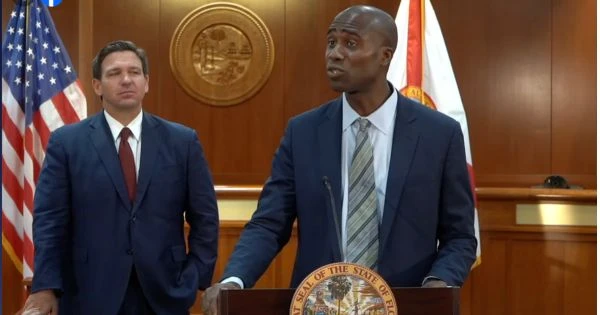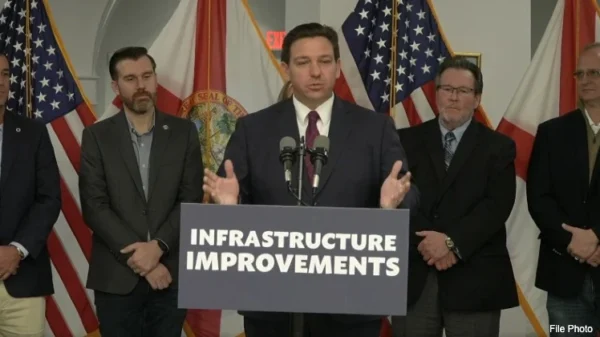On Thursday, U.S. Sen. Marco Rubio, R-Fla., released a list of provisions in the “Coronavirus Aid, Relief, and Economic Security (CARES) Act” that, his office insisted, “will be critical to the state of Florida during the coronavirus pandemic.”
These provisions include Rubio’s “Keeping American Workers Paid and Employed Act,” a small business emergency economic relief plan that provides more than $377 billion for small businesses to meet their payroll and expenses, and receive education and assistance throughout the coronavirus pandemic. Rubio applauded the passage of the CARES Act in the Senate on Wednesday night by a vote of 96 to 0.
“Communities across Florida and our nation are reeling from this unprecedented crisis, and last night the Senate acted on an unprecedented response to provide relief to Americans, small businesses, and our economy,” Rubio said on Thursday. “Our bipartisan small business package, which was included, will provide emergency relief so that millions of American workers can keep their jobs and millions of small businesses can stay open. As our nation works to contain the spread of the coronavirus, I remain in close contact with the Trump administration and Governor DeSantis to ensure that Florida has the resources it needs during this public health crisis.”
Critical provisions for the Florida in the CARES Act include:
State of Florida:
- Extends Temporary Assistance for Needy Families (TANF) and related programs through November 30, 2020.
- 6.2 percent increase in the Federal Medical Assistance Percentage (FMAP) for Medicaid.
- $8.238 billion for Florida to use for expenditures incurred due to the public health emergency with respect to COVID-19 in the face of revenue declines.
- FEMA: $45.4 billion for response and recovery activities and reimbursements provided to states and localities nationwide by the Disaster Relief Fund for emergency and major disaster declarations, as well as funding for FEMA facilities and information technology required to support FEMA’s lead role in coordinating federal response activities. The bill also includes $400 million for grants that can be disbursed in a timely manner for firefighters, emergency managers, and providers of emergency food and shelter.
- On Wednesday, March 25, President Trump granted a Major Disaster Declaration for the State of Florida triggering the release of Federal funds to help people and communities recover from COVID-19.
Healthcare:
- Prevents scheduled reductions of $4 billion in Medicaid disproportionate share hospital (DSH) payments.
- Expands telehealth flexibilities for providers.
- Provides $1.32 billion in supplemental funding to community health centers on the front lines of testing and treating patients for COVID-19.
- Requires COVID-19 testing for everyone at no out-of-pocket costs – Medicare, Medicaid, CHIP, privately insured, and the federal government covers the costs for the uninsured.
- 20 percent Medicare payment increase for hospitals providing inpatient care for COVID-19 patients.
- Suspends 2 percent across-the-board payment reduction from the sequester for Medicare payments through 2020.
- Appropriates $100 billion for hospitals and healthcare providers to cover costs and lost revenue related to COVID-19.
- $250 million for hospital preparedness to improve their capacity to respond to public health emergencies.
- $16 billion for the Strategic National Stockpile (SNS) to procure personal protective equipment, ventilators, and other medical supplies for state and local response efforts. Combined with the first supplemental, Congress has allocated roughly $17 billion for the SNS.
- $1.5 billion for the CDC to disperse for state and local government preparedness and response activities. When combined with the first supplemental, Congress has provided $2.5 billion for state and local needs.
Airports:
- Includes $10 billion for the Federal Aviation Administration (FAA) Airport Improvement Program (AIP) to maintain airport operations at a time when there is a record drop in passengers.
- Small Businesses: $350 billion to support forgivable loans through a new Paycheck Protection Program for:
- Small employers with 500 employees or fewer, as well as those that meet the current Small Business Administration (SBA) size standards; Self-employed individuals and “gig economy” individuals; and Certain nonprofits, including 501(c)(3) organizations and 501(c)(19) veteran organizations, and tribal business concerns with under 500 employees.
- The size of the loans would equal 250 percent of an employer’s average monthly payroll. The maximum loan amount would be $10 million. Covered payroll costs include salary, wages, and payment of cash tips (up to an annual rate of pay of $100,000); employee group health care benefits, including insurance premiums; retirement contributions; and covered leave.
Unemployment Assistance:
- Creates a new Pandemic Unemployment Assistance program to provide unemployment benefits to those who do not qualify for traditional Unemployment Insurance (UI), such as the self-employed and gig-workers.
- Provides Florida with funding to run its Short-Time Compensation program (also known as the “work sharing” program), where employers reduce employee hours instead of laying off workers and the employees with reduced hours receive a prorated unemployment benefit. This provision would pay 100 percent of the unemployment insurance costs Florida incurs in providing this short-time compensation through the end of the year.
- Creates an additional $600 per week payment to each recipient of unemployment insurance or Pandemic Unemployment Assistance for up to four months.
Higher Education:
- Waives the institutional matching requirement for campus-based aid programs, and enables institutions of higher education (IHEs) to transfer unused work-study funds to be used for supplemental grants.
- Allows IHEs to award additional Federal Supplemental Educational Opportunity Grant (SEOG) funds to assist undergraduate or graduate students needing aid for unexpected expenses and unmet financial needs.
- For students who drop out of school as a result of a qualifying emergency, they can exclude the semester or term they were unable to complete from counting toward their federal academic requirements, lifetime subsidized loan eligibility, and/or their Pell Grant duration limit.
- Waives the requirement for IHEs to calculate and refund Pell grants or federal loan assistance to the Department of Education for students who drop out of school due to a qualifying emergency.
Protects students from suddenly losing their Pell grants or federal loan assistance for the semester or term they had to drop out as a result of a qualifying emergency. - The Secretary will defer all loan payments, principal, and interest due on Direct and Federal Family Education Loan (FFEL) student loans for 6 months, through September 30, 2020, without penalty to the borrower.
Nutrition:
- Waives nutrition requirements for Older Americans Act (OAA) meal programs during the public health emergency related to COVID-19 to ensure seniors can get meals in case certain food options are not available.
- $15.51 billion in additional Supplemental Nutrition Assistance Program (SNAP) funding to cover the waiver authorities granted in the Families First Coronavirus Response Act, as well as anticipated increases in participation as a result of coronavirus.
- $8.8 billion for Child Nutrition Programs to fund additional food purchases and demonstration projects to increase flexibility for schools.
- $450 million for the Emergency Food Assistance Program for the purchase of commodities and distribution of emergency food assistance through community partners, including food banks.
- $9.5 billion in emergency response funding to support agricultural producers impacted by COVID-19.
Individual Assistance:
- All U.S. residents with adjusted gross income up to $75,000 ($150,000 married), who are not a dependent of another taxpayer and have a work eligible social security number, are eligible for the full $1,200 ($2,400 married) rebate.
- In addition, they are eligible for an additional $500 per child. For the vast majority of Americans, no action on their part will be required in order to receive a rebate check as the IRS will use a taxpayer’s 2019 tax return if filed, or in the alternative their 2018 return.
- This includes many low-income individuals who file a tax return in order to take advantage of the refundable Earned Income Tax Credit (EITC) and Child Tax Credit (CTC). The rebate amount is reduced by $5 for each $100 that a taxpayer’s income exceeds the phase-out threshold.
- The amount is completely phased-out for single filers with incomes exceeding $99,000, $146,500 for head of household filers with one child, and $198,000 for joint filers with no children.
- Provides up to 90 days of forbearance for multifamily borrowers with a federally backed multifamily mortgage loan who have experienced a financial hardship. Borrowers receiving forbearance may not evict or charge late fees to tenants for the duration of the forbearance period.
- For 120 days beginning on the date of enactment, landlords are prohibited from initiating legal action to recover possession of a rental unit or to charge fees, penalties, or other charges to the tenant related to such nonpayment of rent where the landlord’s mortgage on that property is insured, guaranteed, supplemented, protected, or assisted in any way by the U.S. Department of Housing and Urban Development (HUD), Fannie Mae, Freddie Mac, the rural housing voucher program, or the Violence Against Women Act of 1994.
Notable Tax Provisions:
- Refundable payroll tax credit for 50 percent of wages paid by employers to employees during the COVID-19 crisis. The credit is available to employers whose (1) operations were fully or partially suspended, due to a COVID-19related shut-down order, or (2) gross receipts declined by more than 50 percent when compared to the same quarter in the prior year.
- Allows employers and self-employed individuals to defer payment of the employer share of the Social Security tax they otherwise are responsible for paying to the federal government with respect to their employees.
- Relaxes the limitations on a company’s use of losses. Net operating losses (NOL) are currently subject to a taxable-income limitation, and they cannot be carried back to reduce income in a prior tax year. The provision provides that an NOL arising in a tax year beginning in 2018, 2019, or 2020 can be carried back five years. The provision also temporarily removes the taxable income limitation to allow an NOL to fully offset income.
- Accelerates the ability of companies to recover those Alternative Minimum Tax (AMT) credits, permitting companies to claim a refund now and obtain additional cash flow during the COVID-19 emergency. The corporate AMT was repealed as part of the Tax Cuts and Jobs Act, but corporate AMT credits were made available as refundable credits over several years, ending in 2021.
- Temporarily increases the amount of interest expense businesses are allowed to deduct on their tax returns, by increasing the 30-percent limitation to 50 percent of taxable income, with adjustments, for 2019 and 2020.
- Enables businesses, especially in the hospitality industry, to write off immediately costs associated with improving facilities instead of having to depreciate those improvements over the 39-year life of the building.


















